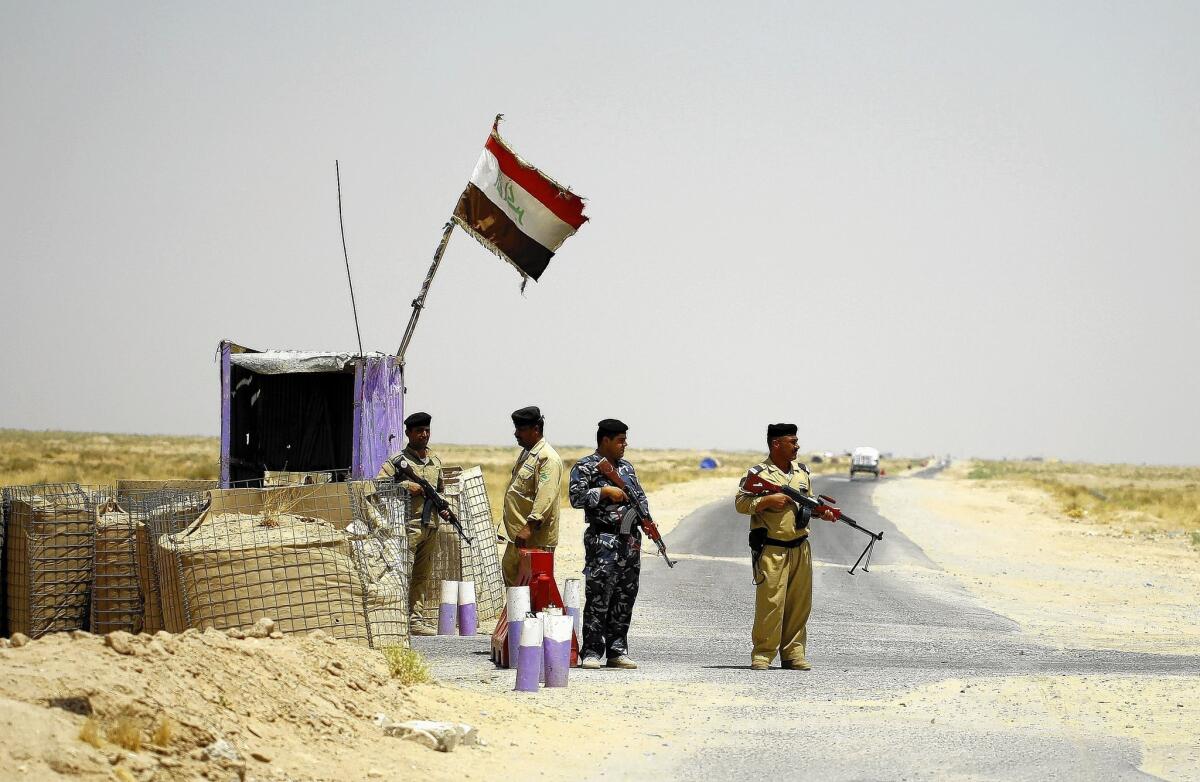Amid Iraq unrest, idea of three autonomous enclaves gains traction

- Share via
Reporting from Washington — As Islamic militants have advanced farther into Iraq’s heartland, the Obama administration has tried to avert all-out civil war by urging the Shiite Muslim-led government to share more power with alienated Sunni and Kurdish minorities.
But if Iraqi Prime Minister Nouri Maliki continues to resist a political settlement, the U.S. and its allies could turn to an idea that was first floated — and roundly condemned — during the height of Iraq’s sectarian fighting eight years ago.
Many analysts and officials, including some in the Obama administration, believe that a possible fallback plan for reducing strife is to split Iraq into three largely autonomous enclaves — corresponding roughly to the dispersion of Sunnis, Shiites and Kurds around the country — linked by a weak central government.
The idea came to attention in 2006 when then-Sen. Joe Biden and foreign policy analyst Leslie Gelb wrote an op-ed column advocating this “federalism” approach. At a time when most experts were looking to unify the country, the proposal was rejected by “every single Mideast analyst,” said Gelb.
But now, with Iraq and neighboring Syria facing indefinite ethnic strife, the idea of a confederation that would preserve the current borders and possibly ease the fighting is looking more attractive to some in Washington, the Muslim world and Europe.
“People in the administration are interested,” said Gelb, president emeritus of the Council on Foreign Relations. If the advance of militants led by the Islamic State, an Al Qaeda splinter group, is halted and the political maneuvering in Baghdad yields a new leadership, he said, “I think you’ll see it floated.”
Any move to partition Iraq into separate states would face enormous difficulties. Kurds, Sunnis and Shiites live side by side in key areas of the country, including in Baghdad and parts of the oil-rich north, which could make efforts to divide them a source of even greater upheaval.
Nor is there any sign that the militants fighting government troops, in some cases only few dozen miles outside Baghdad, would agree to a political settlement.
With a third of the country now out of Baghdad’s grip, an outcome more likely than formal partition could be de facto division of the country even as fighting continues for control of oil and scarce water resources, multiethnic towns, infrastructure and military bases, analysts said.
But the idea of greater federalism has been embraced by some Iraqi Kurdish and Sunni leaders, including Usama Nujaifi, the Sunni speaker of Iraq’s Council of Representatives.
Though the Obama administration’s policy is to press for a more “inclusive and responsive” Iraqi leadership, some U.S. officials say privately that a more decentralized structure might be the best outcome for a dire situation. (The White House wouldn’t comment on whether Biden still supported the federalism approach.)
Under the Biden-Gelb proposal, Iraq would retain its current borders. Its central government would be responsible only for policing borders, dividing oil revenue and coordinating foreign policy.
As with Bosnia-Herzegovina, the multiethnic nation created in 1995 after the breakup of Yugoslavia, the regions would run their own internal affairs and even maintain their own armies, as the Kurdish region already does.
Some experts contend that the breakup of Mideast countries into ethnic states may be a natural and inevitable outcome of the upheaval that has swept through the region in recent years. The old system, in which secular strongmen used force and repression to hold together feuding ethnic and sectarian groups, was bound to collapse, they say.
A partition could draw regional powers Iran and Turkey more deeply into the conflict. Iran, for example, wouldn’t want to allow its Kurdish region to be joined to an independent Kurdish state, and it would probably fight to back up Iraqi Shiite efforts to expand territory under their control.
The Sunni and Shiite regions might not end up as united, stable states. A bloody struggle pitting Islamic State militants against forces once loyal to former Iraqi leader Saddam Hussein and Sunni tribes is only a matter of time, many analysts say.
A plan for decentralization might avert some of the worst strife. But it would still require compromise at a time when the three groups may be even less inclined than in the past to trust one another.
Gelb, a former U.S. official and New York Times correspondent, acknowledged that a move to decentralization faces hurdles, starting with the need for Iraqi politicians to show a leadership they haven’t demonstrated thus far.
“The lead has to come from Baghdad, and it doesn’t look like it will,” he said.
Others are even more skeptical.
“The partition has already happened,” said Adam Ereli, a former U.S. ambassador to Bahrain. Though it may have been valuable earlier on to try to patch up the differences in Iraq, at this point “it’s delusional.”
Ereli said he feared the breakup would lead to humanitarian disasters, such as a refugee exodus similar to the one that followed the Indian partition of 1947, and military clashes that could draw in Iran and Turkey.
Rep. Adam Schiff (D-Burbank), a member of the House Intelligence Committee, said, “The question is, which is more stable: one Iraq that’s constantly in an internal war with itself, or three pieces that are extraordinarily hostile? It’s very hard to say.”
In either case, “it will probably take decades to sort out,” he said.
More to Read
Sign up for Essential California
The most important California stories and recommendations in your inbox every morning.
You may occasionally receive promotional content from the Los Angeles Times.











